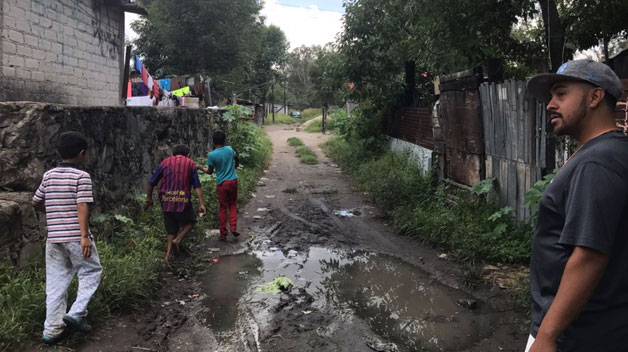GUANAJUATO, MEXICO – Jose Flores lives with his father in a six-room, concrete house next to the warehouse that his father manages in a town called Acambaro.
Flores feels blessed he and his dad live a decent life with wi-fi and running water, but the community surrounding them brings a pained look to his face. He grew up in Detroit, the poorest big city in the United States. Since he was deported earlier this year, he’s lived among a level of poverty that is difficult to fathom.
On a September afternoon, Flores unlocked the steel gate that separates his neat, little home from what lies beyond. The gate creaked open into a different world, revealing rows of shanty houses patched together with scrap metal. A group of school-age children, some wearing no shoes and one donning a UNICEF T-shirt, were not in school, but trudging down a dirt path trailed by three grungy dogs.
Flores stepped his high-top Nike shoes over mud puddles as he explained in a low voice that the houses appear to have electricity, but he’s doesn’t know if they have running water.
“You hear the stories, but once you see it, you can’t believe it,” Flores, 23, said of the poverty.
The state of Guanajuato, in central Mexico, is one of the 10 richest in the nation. Its average wage last year was about 11,762 pesos per month, the equivalent of $611 U.S. dollars. Nearly 45 percent of its residents live in poverty, about 10 percentage points more than Detroit, which is the poorest big city in the United States.
Flores grew up in southwest Detroit as an undocumented immigrant after his family took him to the U.S. on a visitor’s visa when he was 3-years old. He was arrested last year for drunk driving and deported in February.
His new life – surrounded by poverty and often homesick for the U.S. – serves as an example of what hundreds of thousands of other young immigrants who grew up in America might soon face.
While Flores tries to adjust to a new life in Mexico, the Deferred Action for Childhood Arrivals program is set to expire next year, putting thousands of other Mexican young adults at risk of deportation from the United States.
DACA provides an estimated 800,000 young adults who were brought to the U.S. as children – 618,000 from Mexico – a renewable two-year protection from deportation as long as they go to school, work and stay out of trouble with the law.
President Barack Obama implemented DACA in 2012 for undocumented immigrants who arrived by the age of 16 and lived in the U.S. since 2007 or earlier. It was in response to Congress’ failure to act on the Dream Act, a bill that would’ve provided youth who were brought to America a path to permanent residency.
President Donald Trump on Sept. 5 rescinded DACA, announcing that it will expire March 5 unless Congress acts to restore it. Trump, who has promised to build a wall between Mexico and the United States, wants Congress to come up with a comprehensive plan to reduce immigration.
Michigan is home to about 6,400 DACA recipients, known as Dreamers. Dreamers and those eligible for DACA pay nearly $16 million in state and local taxes each year in Michigan, according to the Institute on Taxation and Economic Policy, a nonprofit research group in Washington, D.C.
Flores did not finish high school in Detroit and was therefore unable to apply for DACA.
One of the Dreamers whose protection from deportation is caught in the immigration controversy is Flores’ brother, Adonis Flores, an activist with Michigan United, a statewide group that advocates for immigrants.
Adonis Flores, 29, is a student in Wayne State University’s school of business administration and was granted DACA protection in 2014.
Jose Flores is proud of his brother and hopes he will be able to live out his dreams America. Jose, however, has little hope for returning to his family in America anytime soon. He said he would have to wait until his mother, who is a permanent U.S. resident, earns full citizenship and is able to assist with his return to the United States.
“That would be a long time from now,” he said.
A family divided
Jose Flores has a sadness that sits close to the surface.
It’s in his eyes when he talks about the family he left behind in Detroit.
Underneath the bill of Flores’s Detroit Lions cap, underneath a newish beard, is a slightly babyish, youthful face. Talking about being deported from Detroit to Mexico brings on a tangle of emotions that steals the volume from his voice. He speaks slowly and sometimes slurs together words.
The more he talks about his brother, mother and 17-year-old little sister in Detroit, the lower his voice gets. Many cousins, uncles and aunts live in Detroit, but he also has aunts, uncles, cousins and a grandmother in Mexico as well.

Jose Flores
His father, Jose Antonio Flores, 56, is a quiet and proud man. He lived as an undocumented immigrant in Detroit for five years working as a welder before voluntarily going back to Mexico in 2006 when he and his wife split up.
For him, his son’s return to Mexico is bittersweet.
He knows his son misses America, but he loves waking up to see one of his three children in his home. Too many miles and too many years have kept them from him.
Tears slip from his steely gaze when he talks about the pain he feels from having his children split between two countries.
“It’s difficult,” he said, speaking in Spanish.
Just having a family to return to in Mexico has made Jose Flores’ adjustment less difficult. When he was in detention for three months awaiting deportation, he said he met people who were being deported to countries where they knew no one.
“I’m lucky to have my family,” Flores said.
His father was able to give him a place to stay and a job that paid enough money to even take a vacation to Acapulco this summer.
In early fall, when business at the warehouse is slow, he said misses talking to his little sister or listening to the rapper Gucci Mane while hanging out with his friends in southwest Detroit.
No customers stopped by the small warehouse on a sunny Wednesday afternoon in September. But the fall harvest would soon bring busy days buying corn from local farmers and selling it to businesses that make tortillas and other products.
 Until then, he planned to keep count of the 50-kilogram sacks of fertilizer in the warehouse and remodel a room in the house – which doubles as the warehouse office – into a conference room for customers.
Until then, he planned to keep count of the 50-kilogram sacks of fertilizer in the warehouse and remodel a room in the house – which doubles as the warehouse office – into a conference room for customers.
Flores calls home to Detroit at least once a week. On Sundays, he tries to catch the Lions’ game online on his laptop.
Flores is not sure what he will do with the rest of his life, maybe finish high school and go to college.
“At first, I was pretty sad because I felt like I was leaving everyone behind – my family and friends. I don’t feel too sad (any more) because of the way my family took care of me when I got here,” he said.
“Who am I here? I’m still trying to figure that out. I guess right now you can say my dad’s helper,” he said.
“I got to figure out what I want to do with my life.”









